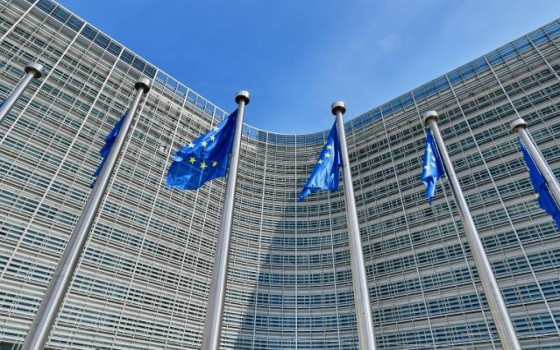
اجتماع وزراء خارجية الاتحاد الاوروبي: العلاقات مع واشنطن والوضع في الشرق الاوسط ومعضلة موقف المجر من تجديد العقوبات ضد موسكو

- Europe and Arabs
- الاثنين , 27 يناير 2025 10:44 ص GMT
بروكسل : اوروبا والعرب
تستضيف بروكسل اليوم اجتماع وزراء خارجية الدول الاعضاء برئاسة الممثلة العليا للشؤون الخارجية والسياسة الأمنية في الاتحاد الأوروبي، كايا كالاس. وقال بيان رسمي اوروبي حول اجندة الاجتماع ان ابرز الموضوعات المطروحة هي :
العدوان الروسي على أوكرانيا
سيناقش وزراء خارجية الاتحاد الأوروبي العدوان الروسي على أوكرانيا، بعد تبادل غير رسمي للآراء مع وزير خارجية أوكرانيا أندري سيبيا، عبر مؤتمر عبر الفيديو.
العلاقات بين الاتحاد الأوروبي والولايات المتحدة
خلال الغداء، سيتبادل المجلس وجهات النظر حول العلاقات بين الاتحاد الأوروبي والولايات المتحدة.
الوضع في الشرق الأوسط
سيناقش المجلس آخر التطورات في الشرق الأوسط، بما في ذلك سوريا.
سيناقش مجلس الشؤون الخارجية الشؤون الجارية، مع التركيز على الأحداث الأخيرة والتطورات السريعة في مجال الأمن والدفاع.
في إطار هذا البند، من المتوقع أن يتطرق الوزراء إلى التطورات في مولدوفا وجورجيا. و عشية مجلس الشؤون الخارجية، استضافت الممثل الأعلى للسياسة الخارجية مأدبة عشاء حول بيلاروسيا.
واليوم ، وقبل بدء اجتماع المجلس، عقد وزراء خارجية الاتحاد الأوروبي مناقشة إفطار حول التهديدات الهجينة.
وحول احد الملفات الشائكة المطروحة امام الوزراء هو ملف العقوبات الاوروبية ضد روسيا ووجود انباء عن خطة للمجر لتعطيل صدور قرار حول ه١ذا الصدد بحسب ماذكرت مجلة " بلاي بوك " وهي النسخة الاوروبية من مجلة بولتيكو السياسية الاميركية والتي قالت تحت عنوان
صفقة العقوبات المجرية
انه من المرجح أن تتجنب الصفقة تهديد العقوبات المجرية: يبقي رئيس الوزراء المجري فيكتور أوربان بروكسل مرة أخرى على حافة الهاوية بتهديد بمنع تجديد العقوبات ضد روسيا، بما في ذلك تجميد أصولها المالية في الاتحاد الأوروبي. إنها خطوة من شأنها أن تعرض حملة الضغط الاقتصادي التي يشنها الاتحاد الأوروبي ضد موسكو للخطر.
لا ينبغي لنا أن نتعامل مع هذا الأمر باستخفاف: فقد أثار تهديد المجر تحذيرات رفيعة المستوى، بما في ذلك من رئيس الوزراء البولندي تاسك، الذي كتب على موقع X: "إذا نجح [أوربان] حقًا في منع العقوبات الأوروبية في لحظة حاسمة للحرب، فسيكون من الواضح تمامًا أنه في هذه اللعبة الكبيرة من أجل أمن ومستقبل أوروبا، فإنه يلعب في فريق بوتن، وليس في فريقنا. مع كل العواقب المترتبة على هذه الحقيقة". وقال أحد دبلوماسيي الاتحاد الأوروبي إن المجر "تلعب بالنار" و"تضع قنبلة في العلاقات عبر الأطلسي" إذا منعت العقوبات.
الحل: وفقًا لدبلوماسيين اثنين من الاتحاد الأوروبي، فإن صفقة اللحظة الأخيرة لتجنب تهديد المجر أصبحت في الأفق الآن. ومن المتوقع أن تتراجع بودابست مقابل بيان يتناول مخاوف المجر بشأن "أمن الطاقة". ومن المقرر أن يتجمع سفراء الاتحاد الأوروبي خلال اجتماع طارئ في الساعة 9 صباحًا قبل بدأ اجتماع اليوم ومن المتوقع أن يتم إضفاء الطابع الرسمي على الاتفاق خلال اجتماع لوزراء الخارجية بدأ في الساعة 10 صباحًا في بروكسل، وفقًا لما ذكره أحد الدبلوماسيين في رسالة نصية إلى Playbook.
مجرد تخمين: قال وزير خارجية ليتوانيا كيستوتيس بودريس للصحفيين يوم الأحد إن سيناريو منع المجر لتجديد العقوبات اليوم "ليس السيناريو الأساسي". "سيترك هذا الاتحاد الأوروبي والمجر في موقف ضعف ... وهذا من شأنه أيضًا أن يحد من الولايات المتحدة من حيث الخيارات التي تسعى إلى سلام مستدام طويل الأمد في أوروبا".
خيارات أخرى: خلال عطلة نهاية الأسبوع، قال الرئيس الأوكراني فولوديمير زيلينسكي إن كييف ستكون على استعداد للتوقيع على صفقة لضخ الغاز الأذربيجاني إلى المجر وسلوفاكيا، بشرط ألا يستفيد الكرملين من الترتيب. "نحن لا ننوي أن نسمح لأوكرانيا بتمديد العقوبات".
"لن نمدد عبور الغاز الروسي"، هكذا قال قبل انتهاء الاتفاق مع موسكو في يناير/كانون الثاني. "لن نسمح لهم بكسب مليارات إضافية من دمائنا".
أردوغان ينقذ الموقف؟ كما تدخلت تركيا في الأزمة، حيث قال سفيرها لدى الاتحاد الأوروبي فاروق كايماكجي لزميلي غابرييل جافين يوم الأحد إن أنقرة مستعدة للمساعدة في استبدال أوكرانيا كدولة عبور.
وخلف الكواليس، يتذمر دبلوماسيو الاتحاد الأوروبي. وقال دبلوماسي ثالث من الاتحاد الأوروبي: "إنهم [المجريون] يحبون الدراما"، وأضاف أن التدابير سوف يتم تمديدها بطريقة أو بأخرى.












لا يوجد تعليقات